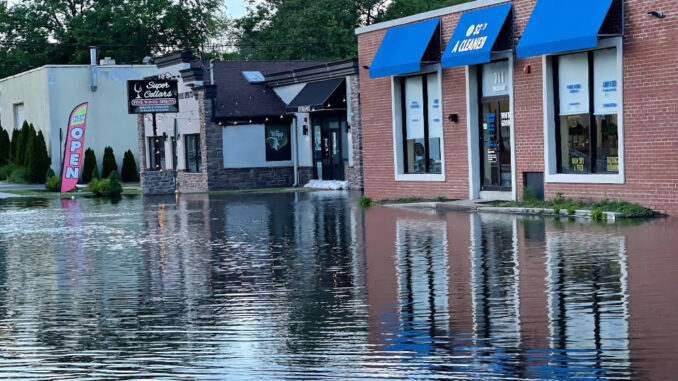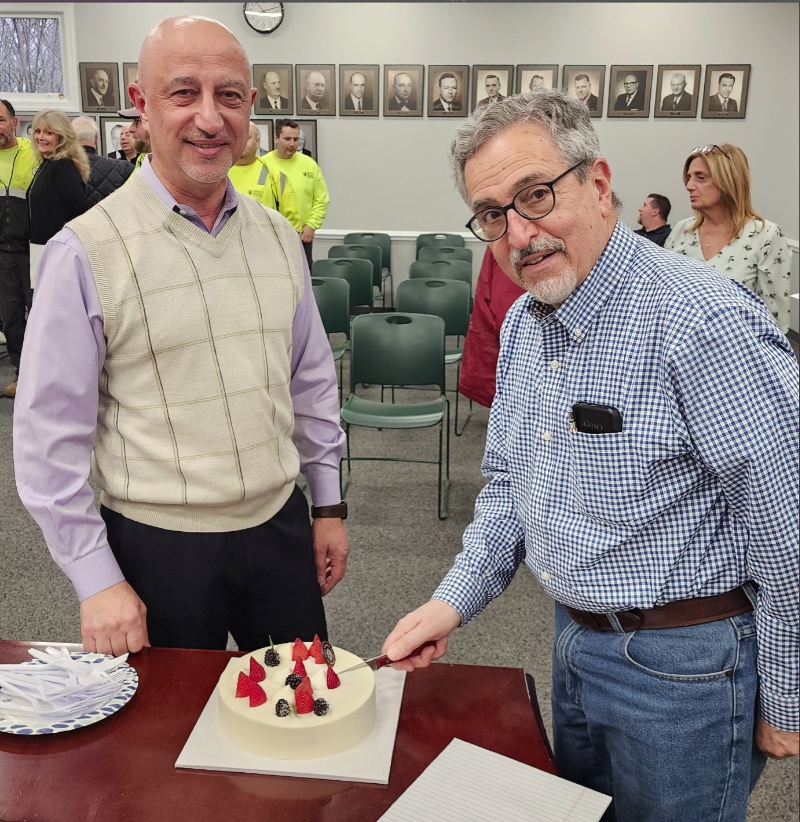
HILLSDALE—A $50,400 proposal to provide conceptual drawings, designs and cost estimates for possible floodproofing building alternatives at the flood-prone public works facility likely will come before the Hillsdale Council at its March 16 meeting.
Councilwoman Abby Lundy told Pascack Press that the council planned a March 16 vote but that that may be affected by ”how the transition with the new business administrator [Montvale Mayor Michael Ghassali] goes.”
On Feb. 14, council briefly discussed the proposed Colliers Engineering and Design (CED) study of floodproofing alternatives, with administrator David Troast noting that funds for the study needed to be included in the upcoming 2024 budget.
Lundy wondered if the study could be funded through previously received American Rescue Plan (ARP) funds.
Pascack Press requested a copy of the CED proposal letter but it was denied as the CED letter was considered “draft” until officially approved by the council, said Borough Clerk Denise Kohan.
Told that we were going to report on the document nevertheless, and would rather have it for reference, the clerk explained why such documents are withheld.
Kohan said, “I cannot release a document that is not finalized. Changes can be made to it and until it becomes finalized, this is where the OPRA exemptions come in. I have attached a list of those exemptions in which I must follow … The document has not been approved by council and therefore is considered a deliberative document until it is finalized and approved by council. These are guidelines which municipal clerks follow when replying to records requests.”
Mayor John Ruocco has pressed for release of such “draft” documents previously, most especially when reports, letters, or studies are to be discussed in public and involve taxpayer funds.
Occasionally, such mayor-council exchanges have grown heated, but no change has occurred as the borough clerk consistently follows the state’s Open Public Records Act, which allows exemptions for public records considered to be “advisory, consultative or draft” documents.
Troast said that funding the CED study might be possible via ARP, and said an accountant he spoke to at the State League of Municipalities said “a really good case” could be made for using ARP funds. He said he would reach out to state officials to see if ARP funding could be used.

He said the CED study would “prepare a couple of concepts” for the DPW building in its current location, and possibly a replacement building elsewhere on the site.
He said the future DPW facility designs were “very complex” as they required new site designs to be compatible with state Department of Environmental Protection rules that affect the site.
He said, “When you overlay those changes with NJDEP rules, what would DEP accept or not accept, that would be part of it.”
Troast said he did not put the study on the Feb. 14 agenda for approval because a funding source was needed. He said he could not find any capital program for the study and hoped a funding source would be located, possibly in the upcoming budget if needed.
Rehabilitation resolution
Also on Feb. 14, the council approved resolution 23073, by a 5-0 vote, that sends a draft resolution to the Planning Board to allow the council to designate certain identified properties as “in need of rehabilitation” according to New Jersey’s Local Redevelopment and Housing Law.
It also forwarded a copy of DMR Architects preliminary investigation that determined that certain properties, identified by lot and block number, fit specific criteria to be considered as an area in need of rehabilitation.
According to the resolution, these properties include Block 1209, Lot 1; Block 1101, Lots 4-9; Block 1206,K Lots 1, 2, and 10; Block 1201, Lot 5-11; Block 1401, Lot 8; Block 1408, Lots 2-7; Block 1409, Lots 1-9; Block 1407, Lots 10-14; Block 1102, Lots 1-4; Block 1309, Lots 12-16; Block 1105, Lots 1-4; Block 1104, Lots 1-5; Block 1103, Lot 1; Block 1106, Lots 1-3,4.01, 4.02, 4.03, and 4.04; Block 1107, Lots 1-8, 19 and 20; Block 1308, Lots 19-21 and 1; Block 1307, Lots 1 and 13; Block 1306, Lots 1, 10, and 11.
The Planning Board has 45 days to respond to the council’s request on whether its proposed rehabilitation recommendations are consistent with the borough Master Plan.
After the council receives back comments from the Planning Board, it will consider the comments and vote at a public meeting, likely in May, to declare the specific properties as an area in need of rehabilitation.
The resolution notes the state Local Redevelopment and Housing Law “permits the governing body to determine, by resolution, that a program of rehabilitation may be expected to prevent further deterioration of an area and promote the overall development of the community.”
If that occurs, the council will direct its planning consultant to develop a rehabilitation plan, and when that plan is completed, council holds a public hearing on the plan. Troast said he anticipated the process to take at least four to six months to complete.
Attorney Mark Madaio asked Feb. 7 that the DMR rehabilitation study be posted on the borough website.
Pascack Press could not find it posted Feb. 21. Efforts to determine if the study was online were not returned by press time
